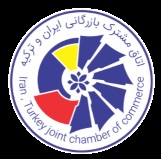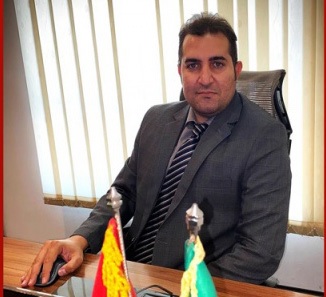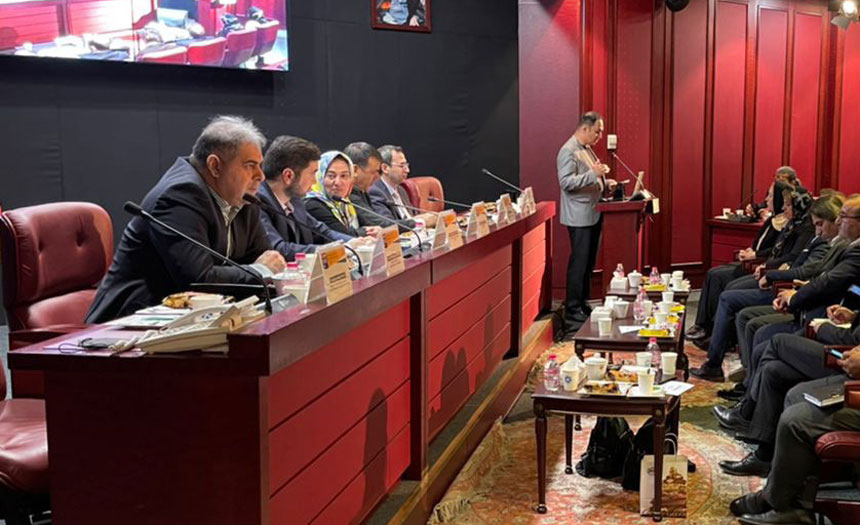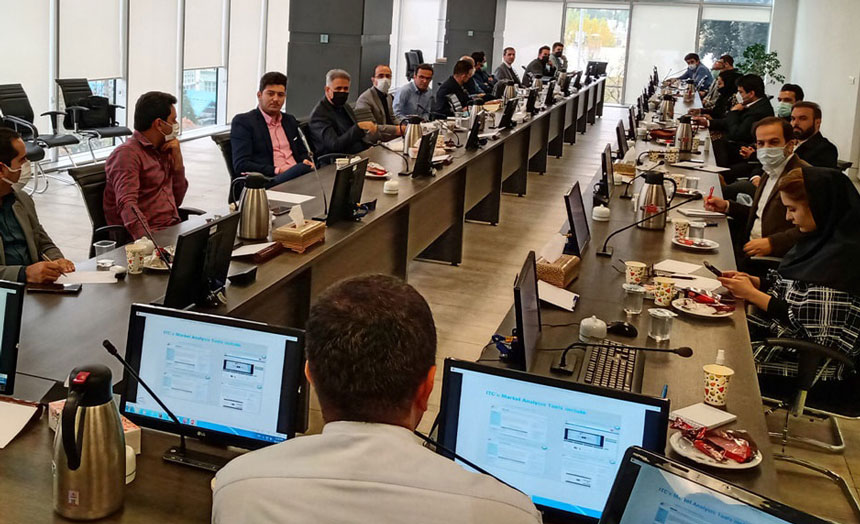By: Trends Editorial Team
Mr. Mehdi Mousaei Deputy of the Iran-Turkey Chamber of Commerce
How do you evaluate current economic, diplomatic, and cultural relations between Iran and Turkey? How are these relations compared to other countries?
Iran and Turkey have close relations forged by shared geography and recognition of the vital role our alliance plays in our security and economic and social prosperity. Iran has been the top oil and gas exporter to Turkey while relying on Turkey for its different needs, especially during the sanctions when the country’s continuous support puts it at the heart of Iran’s foreign affairs. Bilateral ties between the states have been strong during different Iranian administrations, as evidenced by meetings conducted by high-level officials aiming to further the partnership. The borders of the two countries, dubbed the “friendship borders”, have remained unchanged in the 400 years since the Qasr-e-Shirin treaty between Iran and the Ottoman Empire. In the 20th century, the decline of the Ottoman Empire and the rise of the Pahlavi dynasty in Iran marked the beginning of a new phase in Iran-Turkey relations.
What is the volume of trade between the two countries, and what goods or services does it include? Have trade volumes seen upward or downward trends through the years?
According to official statistics, Iran’s exports to Turkey in 2022 stood at $2,518,244,999, while the figures reported for imports from Turkey were $4,382,790,133. Since 2015, trade has had a downward trend, experiencing a significant drop over the last three years. The figures, however, have recovered during the last few months, leading to a rise in 2021 compared to those for 2020. Iran’s main exports to Turkey are natural gas, urea, metals such as aluminum, zinc, copper cathode, wire rods, iron bars, steel, some polymers, handicrafts, and jewelry. Other products include tubes and profiles, glass and related products, and food and agricultural products such as sweet melons, kiwis, grapes, saffron, dried fruits and nuts. Our major imports are press cake, bananas, machinery and equipment, medicine, sunflower seed oil, tobacco, nucleic acids, and fiber.
What are the major challenges to trade between Iran and Turkey (e.g., unilateral sanctions by the US and lack of knowledge about the other country’s market)?
Given the current international restrictions faced by Iranian traders, the greatest challenges are banking transactions, transport systems, and infrastructure development. Banking restrictions make it difficult to engage in official transactions via currency exchange, pushing companies to opt for alternative methods to sidestep obstacles. Another barrier to our trade relations is the shortcomings in the road and rail transportation infrastructure, high transport costs, customs inspections and damage to cargo, restrictive regulations that can affect route choices, long lines at border crossings, and an increase in transportation costs due to old transport networks. One accomplishment was that based on a preferential trade agreement, 140 items of Iranian agricultural goods and 125 items of Turkish industrial goods were exempt from tariffs. Yet, although it was a remarkable step in reducing barriers to bilateral trade, the exemptions were not enforced, which calls for measures to put the agreement into effect.
Tell us about the history of the Iran-Turkey Chamber of Commerce. How many members does it have? What services and support does it offer businesses, traders, and investors in both countries?
As a major contributor to the Iran Chamber of Commerce, Industries, Mines, and Agriculture in the Tehran-Ankara trade partnership, the Iran-Turkey Joint Chamber of Commerce was founded in 2019 in response to the large volume of commercial transactions and the pressing need for targeted and systematic promotion of bilateral trade relations. The chamber aims to encourage investment, solve the issues hampering collaborations between economic players, and resolve legal disputes between Iranian and Turkish firms in conjunction with the two countries’ respective institutions and organizations. The mission of the chamber is to foster discussion and collaboration between Iranian and Turkish stakeholders in trade, industry, service sector, agriculture, and mining.
With over 1000 active members, the Iran-Turkey Chamber of Commerce represents the clear demands of economic actors from both countries. The board of directors is constantly enhancing chamber operations while committees formed by the chamber members solve issues. Services offered to the members include specialized training courses to educate traders on how to conduct business with their Turkish peers and arranging meetings with Turkish actors and trade officials.
Have there been business delegations visiting either of the countries? Are there plans to organize visits in 2023? What events or programs are hosted by the chamber? What incentives (e.g., tax cuts and credits) are offered to traders from the two countries? Please expand on the countries’ common trade laws.
One of the main actions of the Iran-Turkey Joint Chamber of Commerce in recent years has been the organization of specialized meetings between Iranian traders and industries and Turkish trade authorities and leading businesses, resulting in collaborations, development of bilateral trade and reduction of challenges and issues. The international exhibitions held in Turkey are announced and arrangements are made for members to attend them. Other business, industry and technology events are hosted at different times throughout the year to introduce the potentials of the country to world markets and give technology companies the opportunity to showcase their achievements and attract foreign investments.
With the growing population of Iranians in Turkey in mind, what services does the chamber offer Iranian entrepreneurs and business owners?
What services and professions can Iranians fill? What areas do you recommend for investment?
There are many opportunities in the technology sector. The manufacture of innovative and technologically advanced products, which is our advantage, is lacking in Turkey and everywhere else in the world. It is imperative that we move from exporting raw materials to finished and value-added products. Achieving this objective is at the top of the chamber’s agenda, which recognizes the potential and motivation of the academic, industrial, and manufacturing sectors.
Are there data available on the number of tourists from both Iran and Turkey?
Despite the abundance of tourist attractions in our country, the majority of the journeys are made from Iran to Turkey, which is still the top destination for Iranian tourists leaving the country to invest, purchase property, obtain residence permits or for tourism and trade purposes. To illustrate, in the 2022 Nowruz holidays, 116,628 Iranians were among the first foreign visitors to Istanbul.
Are there examples of successful trade and joint ventures? If yes, what areas do these mainly involve?
There have been many such collaborations made possible through specialized meetings organized by the chamber and consultancy services offered in international affairs that assist members to determine their course of action and identify potential Turkish collaborators.
Bear in mind that, depending on the scope of the two countries’ relations, cooperation and joint ventures range from macro to micro industries. An example is an Iranian software company that is trading with a Turkish counterpart.
To what extent do the Iranian and Turkish diplomatic missions impact the operations of the chamber?
Embassies are instrumental in developing relations, which is why Iran takes full advantage of their potential. The most important step was the lifting of visa requirements in 1963 to illustrate good neighborly relations. Visa waivers continued after the revolution, turning Turkey into a popular destination for Iranians.
What measures have been taken to further the interests of Iranian businesses and brands dealing with Turkish peers? To what extent is the Iran- Turkey Chamber of Commerce in contact with active audiences and traders?
The Iran-Turkey Joint Chamber of Commerce remains up-to-date and maintains close cooperation with corresponding organizations in Turkey. The chamber aims to offer comprehensive and up-to-date services, inform members of the latest regulations and notices in less than 24 hours, provide businesses with advice relevant to their respective fields, and facilitate market-oriented solutions.
Please provide some facts and figures to detail the capital flight from Iran to Turkey last year.
There is no exact domestic data available on shifts in the mobility of Iranians. However, observations and statistics reported by the receiving countries indicate a surge in immigration and foreign investment in neighboring countries as a consequence of the recent events and economic transformations in Iran.
While the Gulf States, particularly the United Arab Emirates, were the top recipients of Iranian foreign investment in the 1990s and 2000s, current observations point to Turkey as the main destination for Iranian capital.
Following modifications in foreign investment policies and the lowering of the minimum investment required for foreign nationals to obtain residence permits, Iranians became the top foreign property buyers in Turkey. Iranian investment accounts for 17% of the Turkish real estate market, with the number of purchases made by Iranians experiencing a tenfold increase in a four-year period, reaching from 700 to 7000 residential units.
Embassies are instrumental in developing relations, which is why Iran takes full advantage of their potential.
The most important step was the lifting of visa requirements in 1963 to illustrate good neighborly relations.
Visa waivers continued after the revolution, turning Turkey into a popular destination for Iranians
Has this capital outflow been mainly in the form of real estate and property ownership, residence permits, launching businesses, or for education purposes? Please share statistics from either side.
Figures suggest that Iranians purchased a total of 23,000 houses between 2015 and 2021, which, with a minimum investment of $250,000, amounts to around six billion dollars in real estate alone. From 2013 to 2021, 4,500 companies were also established by Iranians, which is roughly another three billion dollars. Taking into account investments in the stock market and other areas that are harder to determine, the actual figures are likely to be much higher.
How has capital flight changed over the last three to six months? Has it seen a rise resulting from the currency devaluation occurring in Iran?
Capital outflow is unfortunately accelerating. Although economic factors play a key role in triggering capital flight, there is no single root for the issue, meaning thorough investigations are needed to pinpoint the causes.
Why is Turkey a popular choice for Iranian investors? What differences are there between Iran and Turkey that make the country an appealing investment destination for Iranians? Please provide examples to illustrate the differences.
Turkey’s popularity can be attributed to different factors. Not only are Iran and Turkey neighbors, but they are two Muslim countries that share so much in terms of culture and history. Persian was the official court language during the Ottoman Empire, and several Ottoman kings composed poetry in Persian. Cultural relations have continued to flourish following the Islamic Revolution. Our similarities, coupled with the geographic location of Turkey, which boasts many of the advantages of a European country, and policies adopted by Turkey to encourage foreign investment have made it attractive to Iranians.
Trade issues that prompt Iranians to choose Turkey range from banking restrictions that distort trade, exchange rate volatility, different investment risk levels in developing and industrial countries, economic growth rates and restrictive regulations.






